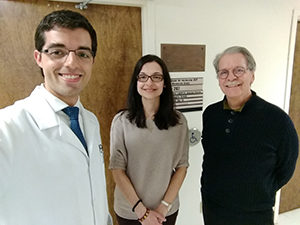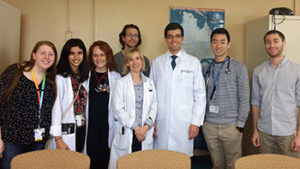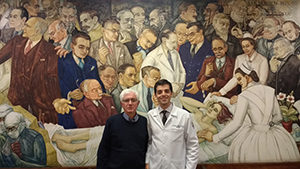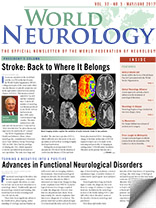By Giordani Rodrigues dos Passos, MD

Giordani Rodrigues dos Passos, observer (left), Mrs. Vanessa Spyropoulos, clinical nurse specialist in the MS program, and Dr. Yves Lapierre, director of the MNH Multiple Sclerosis Clinic.
One month after completing my neurology residency in Brazil, I had the opportunity in March to participate in the Canadian Department Visit Program, during which I served as an observer at the Montreal Neurological Institute (MNI).
The administrative staffs of the WFN and the MNI were excellent, both before and during my stay in Montreal. My schedule was arranged by Dr. Anne-Louise Lafontaine, who made sure to take my main interests into account.
My activities included:
- Clinics of multiple sclerosis (MS), amyotrophic lateral sclerosis, neuromuscular disorders, and movement disorders at the Montreal Neurological Hospital (MNH) for three weeks
- Neurology wards and consultation at the Montreal General Hospital (MGH) for one week
- Weekly grand rounds and teaching sessions at both the MNH and the MGH
- Weekly meetings with the PET team at both the Brain Imaging Center/MNH and the Douglas Institute
- Meetings with professors and PhD students to discuss specific areas of interest
My main interest is MS, which is roughly 10 times more prevalent in Canada than it is in Brazil. From a clinical perspective, this observership was remarkable because I saw several dozen MS patients, covering a wide range of clinical aspects and treatment strategies.
A number of elements stood out for me relating to the functioning of the MNI and the health care system in Canada. They included:

Dr. Anne-Louise Lafontaine (center), chief of the Department of Neurology of the McGill University Health Center, and Giordani Rodrigues dos Passos (third from the right), observer, with neurology residents and medical students during rounds at the Montreal General Hospital.
Health care and research are closely integrated with mutual benefits.
The MNI is remarkably able to communicate its actions and achievements to the scientific community as well as the patients and society as a whole. This increases its ability to raise additional funds for research.
Multidisciplinary teams at the clinics and in the wards improve significantly both the neurologists’ work and patient outcomes.
Canadian neurology residents receive more in-depth training on neuroanatomy, pathophysiology, and semiology than most of their Brazilian counterparts.
Many of these elements could be implemented in my workplace, an 800-bed university hospital in southern Brazil. What I learned at the MNI will improve my practice as a neurologist and researcher in the coming years. It also will serve as a lesson when I have opportunities to participate in my hospital’s institutional decisions.

Dr. Jack Antel (left), professor at McGill University and president of the Americas Committee for Treatment and Research in Multiple Sclerosis, and Giordani Rodrigues dos Passos, observer, at the Montreal Neurological Hospital.
A minor drawback of my observership was the March break, which took place during my first couple of weeks there. During this time, some of the clinic’s work was suspended, and some of the attending neurologists were away from the hospital. Even though I was able to find alternative clinical or academic activities to fill my schedule, I suggest the next observers be advised of the March break and encouraged to choose another month for their MNI visit.
Overall, this was an inspiring, career-changing experience. I recommend the Canadian Department Visit Program for other young neurologists. I congratulate the WFN, the Canadian Neurological Society, and the MNI for fostering education in neurology, and I am grateful for this opportunity. •
Giordani Rodrigues dos Passos, MD, works in the Department of Neurology at São Lucas Hospital in Porto Alegre, Brazil.
